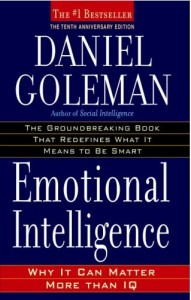Enhancing All Your Relationships through Emotional Intelligence
The original version of this was posted on Leadership Couples.
Do you consider yourself a smart person? If you wouldn’t cross the road when you see a truck coming or can understand why we join a group to improve our capacity to learn, then consider yourself intelligent.
 The standard metric to measure a person’s intelligence is the IQ test. Someone with an IQ of 130 or higher is considered extremely smart (top 2%). The average IQ is around 100. If someone had an IQ of less than 70 (bottom 2%) they likely would be labeled as not smart.
The standard metric to measure a person’s intelligence is the IQ test. Someone with an IQ of 130 or higher is considered extremely smart (top 2%). The average IQ is around 100. If someone had an IQ of less than 70 (bottom 2%) they likely would be labeled as not smart.
As a differentiating value, Intelligence means having the capacity for thought and reason especially to a high degree.
Note the focus of intelligence is purely around one’s intellectual life. This is the world in which most university professors live. As Sir Ken Robinson so eloquently highlights in his famous TED presentation, many professors view their bodies as just a means to transport their heads around the campus.
IQ is all about the head. What’s missing is the heart.
A Rational View of the Heart
 In 1995, Daniel Goleman published a book called “Emotional Intelligence” (now commonly referred to as EQ). It became a best seller. Drawing from the fields of psychology and neuroscience, Goleman offered some new insights into the human mind – what he called our “two minds” – the rational and the emotional.
In 1995, Daniel Goleman published a book called “Emotional Intelligence” (now commonly referred to as EQ). It became a best seller. Drawing from the fields of psychology and neuroscience, Goleman offered some new insights into the human mind – what he called our “two minds” – the rational and the emotional.
In other words, Goleman looks at the heart (emotion) as an extension of the head (rational).
Goleman provides a sound argument (I hope you see the humor in this) that our emotions play a much greater role in thought, decision-making and our success than generally acknowledged. He defines EQ as a set of skills, including self-control, self-motivation, empathy, and social competence in personal relationships.
So, where does EQ fit into marriage?
Applying Emotional Intelligence to Marriage
Do you listen to your spouse through the filter of rational-only or emotion-only?
A popular generalization is that women speak from a place of mostly emotion, while men tend to speak from a place of mostly rational thought. If this were true, the simple fix to create better relationships would be for men to listen for the emotional meaning in what women are saying, and for women to listen to the rational meaning in what men are saying.
Of course, we human beings are a little more complicated than that. Almost everyone possesses the capacity for both rational thought and emotional feelings. But the quality and quantity of each varies.
(Where are you on the EQ scale? Try a free test here.)
Can you listen to your spouse and understand both the meaning of the message and the feeling behind it? Can you maintain control of “your” emotions while listening to your spouse? Can you park your thoughts and ideas while listening to what your spouse is really saying?
Applying EQ to Other Relationships
Thankfully, our EQ is not determined by genetics. The ability to listen well and maintain self-control are skills that can be learned. Thus, developing a stronger, higher EQ in marriage provides many benefits outside of marriage.
If you learn how to listen well to your spouse, imagine how this skill can be transferred to working with customers, employees, and others. If you learn how to manage your emotions and maintain self-control with your spouse, imagine how this skill can benefit you when dealing with frustrated customers, difficult employees, and challenging suppliers.
In other words, strengthening your EQ at home will also benefit your business and other professional endeavors. The value of this skill even transcends into your volunteer work within the community.
And of course, it makes for a stronger, happier marriage!
What is the Emotional Intelligence in your marriage?
How can the value of intelligence help you make a difference in the lives of others?
P.S. My wife says I wrote this from an IQ perspective vs. EQ. What do you think?
Today’s value was selected from the “Knowledge-Skillfulness” category, based on the e-book Developing Your Differentiating Value.







